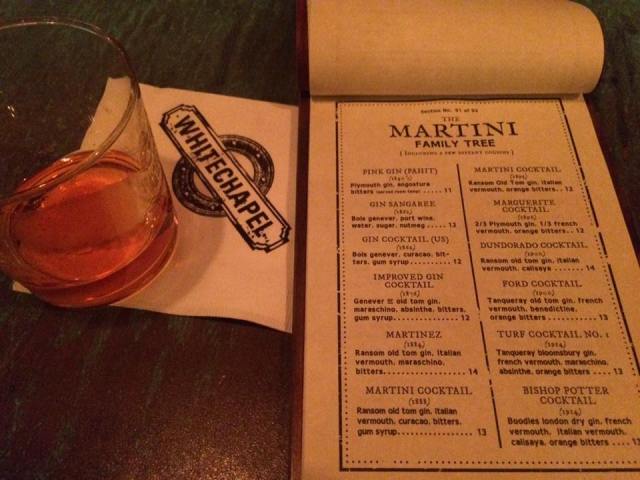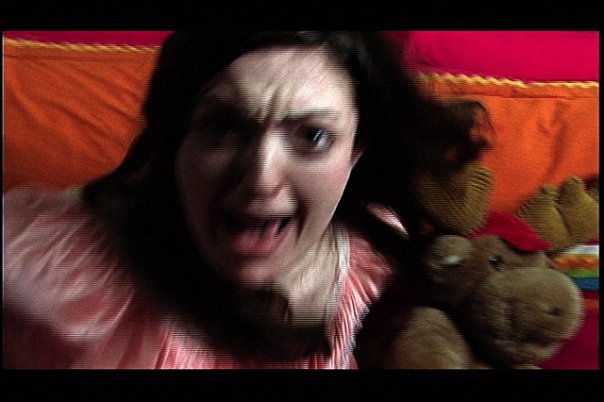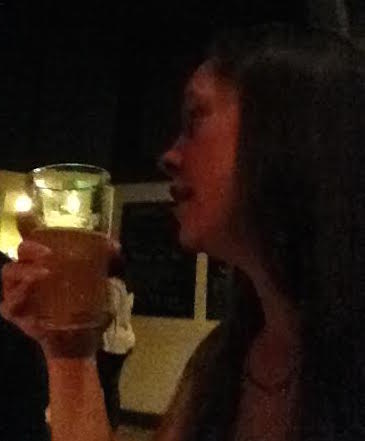Pint Sized V begins its four performance run tonight at PianoFight at 8 PM! We’ve got an amazing line of up of writers this year, and check back next week when we introduce you to our directing team! Meanwhile, here’s Christina Augello, Stuart Bousel, Megan Cohen, Alan Coyne, Elizabeth Flanagan, Jeremy Geist, Christine Keating, Juliana Lustenader, Lorraine Midanik, and Daniel Ng telling you all about what it takes to bring you this year’s collection!
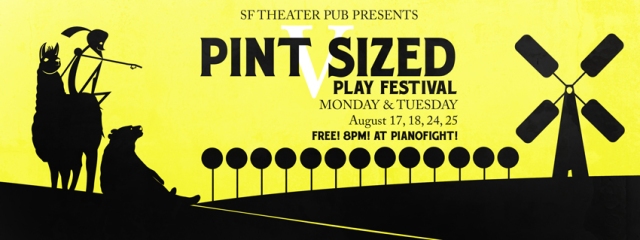
How did you hear about Theater Pub’s Pint-Sized Play Festival and what possessed you to send something in?
Stuart Bousel: Well, as one of the founders of Theater Pub, and the current Executive Director, I knew the festival was around because I’m the guy who puts it on the schedule. That said, I have had a piece in every Pint Sized except Pint Sized II. The first year was a short called Queen Mab in Drag. All the other years, including this one, have been a monologue written for our mascot, the Llama, who was created by Elana McKernan for the first Pint-Sized, and has been played by Rob Ready ever since. No, I don’t have to go through the submission process- I’m grandfathered in every year. Executive Directorship has its privileges.

Stuart Bousel
Christine Keating: I heard about Pint-Sized when it happened in 2013, but I wasn’t able to see it. It sounded fun and exciting, and I enjoy short storytelling in many forms: flash fiction, web shorts, podcasts. I had written my plays a few months ago to get the idea onto paper, and then Pint-Sized seemed like the perfect venue for them!
Lorraine Midanik: I heard about the Festival from a fellow playwright who thought I might be interested. In March, one of my plays was produced at PianoFight’s Shortlived Festival, and I am excited to have another play presented in that terrific venue. I have always been fascinated by the names of beers and thought it would be fun to play with it in my writing.
Elizabeth Flanagan: General stalking of the SF Theater Pub website. I wasn’t fortunate enough to make any of the Pint-Sized performances at the Café Royale but I have seen most of the videos of the plays. Good stuff. I feel privileged to be part of this history. It‘s also pretty special to be included in the first Pint-Sized festival to be performed at PianoFight. My dad lived in the tenderloin and used to take us to Original Joe’s on occasion. It’s very cool to be back at the old stomping grounds in a new way.
Alan Coyne: I almost certainly heard about this iteration of Theater Pub’s Pint-Sized Play Festival through Facebook, and from there, Theater Pub’s website. And I’d heard about previous versions of it from folks who’d been involved in them. I’ve had the idea of Einstein as a bartender in a scene for a long, long time. There’s something about the image of him as a silent observer in a bar, a place where the rules of space-time so clearly intersect with the rules of human behaviour, that I find engaging. And so this festival presented the perfect opportunity to try and explore that notion in my own clumsy way.
Christina Augello: I am very familiar with Theatre Pub and knew it was coming up and got an email reminder and followed the link and there it was and I have been wanting to write and the limited parameters seemed perfect to get me started. (Editor’s Note: And yes, this is Christina’s first play ever!)
Daniel Ng: It was a great experience having my piece, Mark +/-, in Pint-Sized IV, so I’ve been looking forward to submitting again since then.
Jeremy Geist: I found out about it from one of the Theatre Pub people I’m friends with on Facebook. It was only a two-page play submission, and I already had an idea, so I felt it was worth the effort.
Juliana Lustenader: After seeing the call for submissions on the SF Theatre Pub blog, I decided to do some research and found old YouTube videos of past Pint-Sized performances. The plays I watched were all so creative and funny. I knew I had to be involved with the process somehow. Usually I would audition as an actor for these sort of things, but watching those old videos inspired me to write what I think is the silliest five pages I’ve ever written. (Editor’s Note: And yes, this is Juliana’s Bay Area debut as a playwright!)
Megan Cohen: I watched the very first night of Theater Pub ever, years ago, sitting cross-legged on the floor in the front row, then I joined the family immediately, writing a piece for the very next monthly event. The community that’s found each other at Theater Pub is diverse in artistic style, and you never know what you’ll see, but I find that the theatermakers gathered under this banner tend to be reliably open and generous, with each other and with the audience. Pint-Sized feels like a flagship festival to me, because it pulls together so many of us, with our unique voices and approaches, and I just can’t miss it. I’ve written for Pint-Sized every year. I keep coming back here because of happy history, and because we get an unusual crowd. Since the shows are free, people come who otherwise wouldn’t take a chance on a night at the theater, and I love the responsibility of that; it means I better give them something worthwhile to watch, so they’ll come back!
What’s the hardest thing about writing a short play?
Elizabeth Flanagan: Getting it done. I think the big misconception would be that shorts are quicker to write. Not for me they aren’t. I’m always amazed at the amount of time I can spend on a short. I can bang out a rough draft fairly quickly, but the rewrites are tricky. I tend to put just as much work into a short as a full length.
Lorraine Midanik: For me, it’s making sure the turn happens at the right time (not too early, not too late…sort of like Goldilocks!). In a short play, there isn’t much time to develop the characters and have an engaging plot so it’s really a challenge.
Juliana Lustenader: Fitting your 50 page idea into a 10 page limit.
Christine Keating: Crafting characters who are real and relatable in a short conversation.
Jeremy Geist: Creating something meaningful. With a play this short it’s really easy to just write a few pages of filler and call it a day.
Daniel Ng: The hardest thing is crafting a satisfying ending. Compelling concepts/scenarios/gags are relatively easy. Sometimes that’s all you need or have time for in a short piece, but delivering a definitive punchline or reaching a pithy denouement takes a piece to the next level. But it’s hard to get there in a short time in a way that feels organic, that isn’t just tacked on.
Megan Cohen: Short plays can be mistaken for “a little something,” as though their length means they are inherently small, in importance or in impact. The hardest thing is to not fall for that trap. As any poet will tell you, short isn’t the same as small. Keep the play big, and the words few.
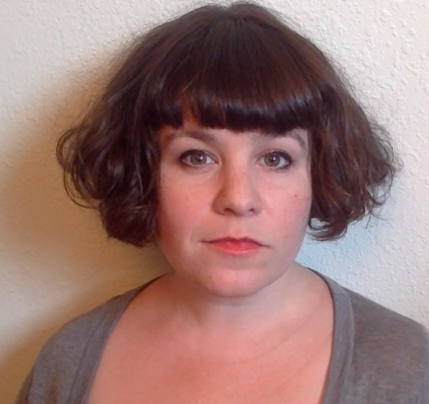
Megan Cohen
Alan Coyne: The hardest thing about writing any play is the foreknowledge that the brilliant, dazzling dialogue in my head is going to come out all lumpy and misshapen when I start using actual words. And then once you start, it takes on a life of its own, and spawns a million new tangents, and you could spend the rest of your life rewriting it, and so finishing it is practically impossible. Thank goodness for deadlines!
Stuart Bousel: These days I don’t really write short plays any more, and the Llamalogues are really speeches, which I’ve always found rather easy to write, actually. That said, there is always all the usual challenges of any writing- which is to keep it interesting, and striking that balance between challenging and accessible- not always easy when your only character is a sort of emotionally unbalanced alcoholic anthropomorphic animal.
Christina Augello: Actually I liked writing a short play and it wasn’t hard at all.
What’s the best thing about writing a short play?
Megan Cohen: Audiences love short work, and that’s enough for me; I just checked, and Pint-Sized will feature the 72nd short of mine produced onstage since 2008. (Wow, just reading that sentence makes me tired.) I like the immediacy of shorts; the way this industry works, a full-length play can take years to develop and find a home onstage, but the turnaround time to production with a short is often a journey of just a month or two. An audience is there almost immediately, showing you how your play works, and what it is. You see what makes them laugh, where they get upset, what they connect with, and you get the goodies now, not later, which is an obvious priority for me as an impatient American.
Lorraine Midanik: I like the opportunity to tell a story in a confined timeframe. It forces me to edit out unnecessary words and actions and focuses me on moving the play along in a fun way.
Daniel Ng: The best thing is bringing something to fruition in a short period of time. This is especially true when working with Pint-Sized, where pieces are quickly produced and performed. It’s like the immediate satisfaction from cooking and then enjoying a great meal.

Daniel Ng
Elizabeth Flanagan: Going deep quick. Often a short will feel like a throw away piece or it seems a little more frivolous, than say a heavy drama in two acts. But, because you have limited space and time, that entire world, those characters need to be created in a matter of words. When it works it’s fantastic. Also with shorts there is great freedom to experiment. With Magic Trick I had a lot of fun playing with a mix of language and genre.
Jeremy Geist: Being able to pursue weird ideas that wouldn’t necessarily work in longer formats. I read a lot of weird/gross things on the Internet and like working them into my writing, but they aren’t substantial enough for a full-length. It’s nice to use short formats to vent some of my more indulgent projects.
Juliana Lustenader: When writing a short play, I feel like I can “get away with” more things. Mainly because it’s over before anyone can go “Hey…”
Stuart Bousel: It’s definitely true that, aside from the length restriction, all other bets are off- and that is liberating.
Christine Keating: Not wasting any time getting to the point. Also, throwing an audience into the deep end of the world of the play is fun.
Christina Augello: You get it done quickly.
Alan Coyne: The best thing about writing a short play, or having it performed, is seeing how much better everyone else involved makes it.
Who do you think is a major influence on your work?
Christina Augello: The theatre artists I know and work with influence my work as well as over 60 years experience in the theatre and life in general.
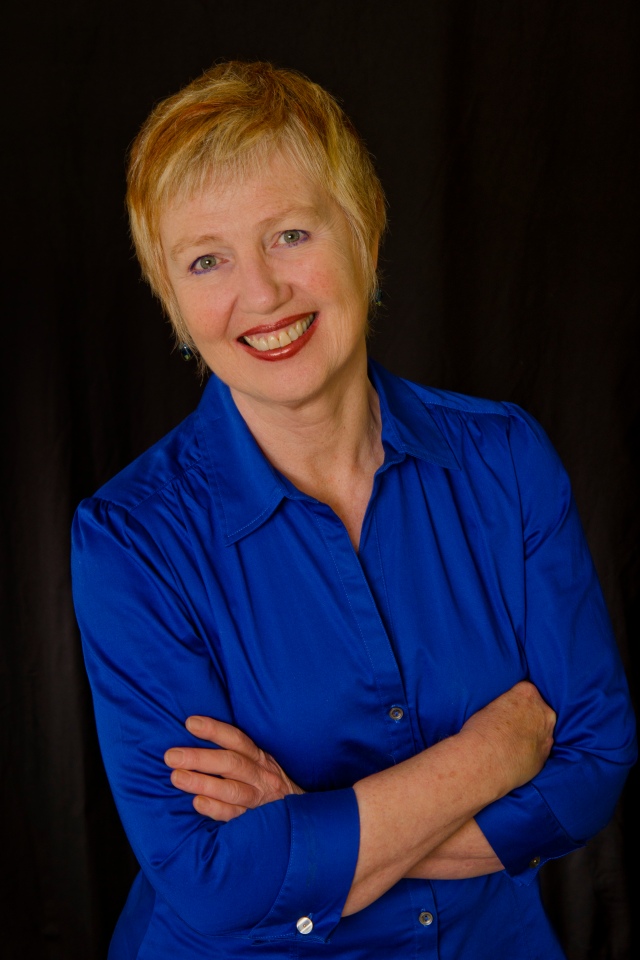
Christina Augello
Megan Cohen: The character of the BEEEEAAR, that is, the character in the monodrama I wrote for this year’s festival, specifically owes a lot to the influence of playwright Charles Ludlam, a leader of the “Ridiculous” aesthetic movement Off-Off Broadway in the 1970s and 80s. His work has taught me a lot about foolishness and dignity, and the entertainment value of earning a good laugh with a bad joke.
Lorraine Midanik: Because I often write about strong, funny women, my mother is my major influence. She passed away in 2008, but her strength and humor always permeate my work and live within me. My writing has also been influenced by Anthony Clarvoe from whom I have taken playwriting classes at Stagebridge for the last 3 years. I am very lucky to have a wonderful husband and two amazing daughters from whom I draw my inspiration.
Elizabeth Flanagan: Depends on the time of day. Thinking of the short form, Alice Munro is one of my favorite short story writers. Maybe I’m not so much influenced by her as I admire her ability to write a near perfect sentence, and I don’t mean grammatically. She’s one of those writers where a line cuts you to your core. You finish the last line, the last word, and you sit, you just sit with it, thinking there was no other ending because it’s so utterly complete.
Stuart Bousel: My influences are all over the place, I’m very intertextual, read a lot, see a lot of movies and theater, and I listen to a great deal of music. John Guare and Marsha Norman are my favorite playwrights, but their plays are sort of non-traditionally structured and my plays often follow a structure closer to film or musicals. My monologues, particularly the direct address ones like Llamalogue, are often structured like songs, with choruses repeated and builds and codas. So, for this one I’m going to say Sondheim, who is always an influence, really, for me. Sondheim, and some Shakespeare too. And Dostoyevsky. And Morrissey. All the greats.
Christine Keating: On these plays, probably comedians like Amy Schumer. In general, my favourite playwrights are Sarah Kane and Martin McDonagh.
Daniel Ng: The past couple of years, I’ve filled in some of my gaps in Vonnegut and Phillip K. Dick. As I get older, I like their ideas (and personal experiences) about persevering in the search for meaning in the face of a bewildering and uncaring, or worse, openly antagonistic world. Like maybe you can be world-weary, yet, at the same time, remain stubbornly human and humane.
Jeremy Geist: This question is hard for me because I can’t point at specific mechanisms I use and say exactly who it came from. In terms of my comedy, I will say I’ve been heavily influenced by a sportswriter named Jon Bois lately. His stuff is some of the best out there these days – check out his Breaking Madden series.
Juliana Lustenader: A major influence on my comedy writing is David Sedaris. I love the way he can spin an average and innocent encounter with another human being into a ridiculous farce using his wit and seemingly endless vocabulary. I didn’t use much wit or vocab in To Be Blue, but it is definitely ridiculous.
Alan Coyne: I’d like to imagine that Douglas Adams is a major influence on my work. I owe at least some of my interest in cosmology to the Hitchhikers’ Guide series, which I encountered early on thanks to my father. And if I could write like anyone, I would want it to be him. Adams, that is, not my father. Although for all I know, my father could also be a brilliant writer. I mean, he could also be a brilliant writer like Adams, not me, I wasn’t saying I was a brilliant writer. Er, let’s move on.
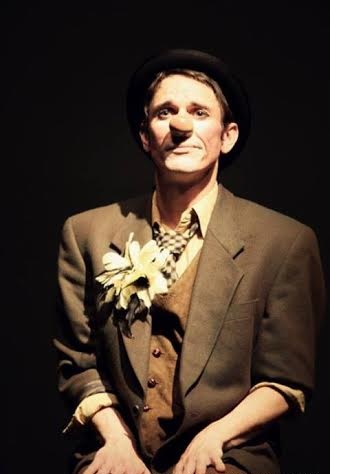
Alan Coyne
If you could pick one celebrity to be cast in your show, who would it be and why?
Elizabeth Flanagan: Because it’s noir I’m tempted to say Bogart or Bacall obviously. But I’d probably lean more towards Cary Grant. He has a better mix of comedy and suspense.
Juliana Lustenader: Kit Harington, so I can selfishly stare at him during rehearsals.
Stuart Bousel: I mean, it’s hard to think of anyone but Rob Ready playing the Llama, but if I had to go with someone else I’m going to say Derek Walcott, who I once heard read and has the like… sexiest voice. Also he’s a brilliant poet and he’d probably be able to do all sorts of exciting line readings a traditional actor wouldn’t necessarily think of.
Megan Cohen: All the roles in all my plays are written for Madeline Kahn; if you’re wondering why, just watch this clip: https://www.youtube.com/watch?v=LTXsec9rvw4M
Lorraine Midanik: That’s a tough question, but I’d have to say Anna Deveare Smith. She is extraordinary in how she takes on the persona of her characters. She is magical on stage by combining advocacy with her outstanding acting and writing.
Daniel Ng: Uzo Aduba. In Orange is the New Black, she perfectly rides that edge between mad fool and truth-teller, comedy and tragedy. And have you heard her story about learning to be proud of her name? Look it up–she’s a hero.
Christina Augello: Ian McKellen….he is a superb actor who’s performances invite you to share in his skill, fun and joy.
Christine Keating: Ilana Glazer and Abbi Jacobson for Part 3, definitely.
Alan Coyne: If I could cast one celebrity in my show, it would be Albert Einstein. But not as himself.
Jeremy Geist: I think Ice-T could do a pretty good job.
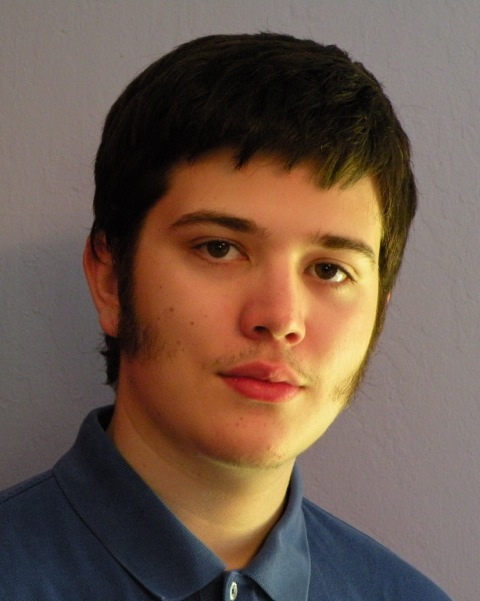
Jeremy Geist
What’s a writing project you are currently working on and/or what’s next for you?
Christina Augello: Working on a personal story to present as a solo show and looking forward to performing in a couple of upcoming plays in 2016.
Christine Keating: I’m directing two plays in Those Women Productions’ In Plain Sight night of one acts (September 4-20) as well as writing a full night of plays on horror tropes about sleep for September’s Theater Pub (September 21-29!).
Elizabeth Flanagan: I’m nearly finished with a new full-length that I affectionately call “the meth play”. I look forward to setting up a reading for that play and hearing it in its entirety. I’m also a cofounder of Ex Nihilo Theater, a new playwright group with Jennifer Lynn Roberts and Bridgette Dutta Portman. We’ll have a reading of short plays on Aug 20 at The Octopus Literary Salon in Oakland and in October we will present the first installment of a new serial play that we will be writing and presenting over the following twelve months. We would love to see you all there!
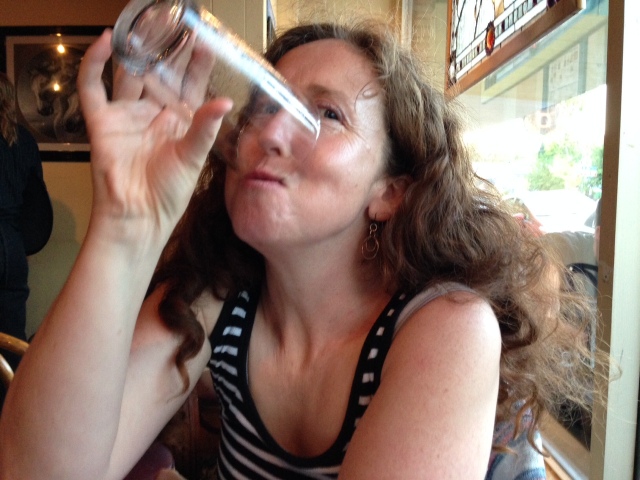
Elizabeth Flanagan
Megan Cohen: I’m writing a big ol’ two-act play about a pair of sisters, where the two actresses switch roles every night, and I’m trying to make the dynamic really taut, elastic just totally pulled to the limit between them; it’s so tense in the draft right now, and I hope it stays that way. I’m getting out of the house a little, too, acting in a show for SF Fringe Festival that runs in September. I’ve taken the role of the photographer Man Ray in the DADA spectacle Zurich Plays, so I’ll be going full trouser-drag for that which, as a 4’11” woman with serious hips, should be a glorious challenge. (http://www.sffringe.org/zurich/) Looking ahead, Repurposed Theatre (http://www.repurposedtheatre.com/) is doing a whole program of my short works and one-acts in December. All world premieres, all written by me, the show has this really fun vaudeville frame and is called The Horse’s Ass and Friends! That’s December 2015 at the EXIT Theater, directed by Ellery Schaar, a fabulously fearless partner who seems able to handle anything that comes out of my mind.
Daniel Ng: I’m trying to finish a short story that has now grown to a novella. There is an end in sight, though it’s merely vague and barely visible. My goal is to beat George R. R. Martin to the finish line.
Juliana Lustenader: Instead of finishing any of my scripts, I distract myself by auditioning for other people’s projects. You can see me as Bianca in The Taming of the Shrew at Curtain Theatre through September and Sister Leo in Nunsense at Altarena Playhouse starting in October.
Alan Coyne: I’ve been working off and on (mostly off) on a musical involving astrophysicists that will never see the light of day. But more relevantly, I’m playing Petruchio in The Taming of the Shrew at the Curtain Theatre in Mill Valley through Sep. 13, and Stevie in Good People at the Waterfront Playhouse and Conservatory in Berkeley through Sep. 6 (yes, simultaneously; no, I didn’t think that through).
Jeremy Geist: Nowadays I’m mostly working on my board game company, follow me at @pknightgames. My flagship release is a Shakespeare-themed combat game called Happy Daggers!
Lorraine Midanik: I’m in the process of revising one of my full length plays after having worked with a dramaturg. The play is entitled Y Women and it focuses on the three very different women who meet in a behavior change program at a local gym. I have been fortunate enough to have had productions or staged readings of three scenes from this play. I’m also a playwright in the Theatre Bay Area’s 2015 ATLAS program (Advanced Training Leading to Artists’ Success) which begins this month. I am very excited to move my work to the next level.
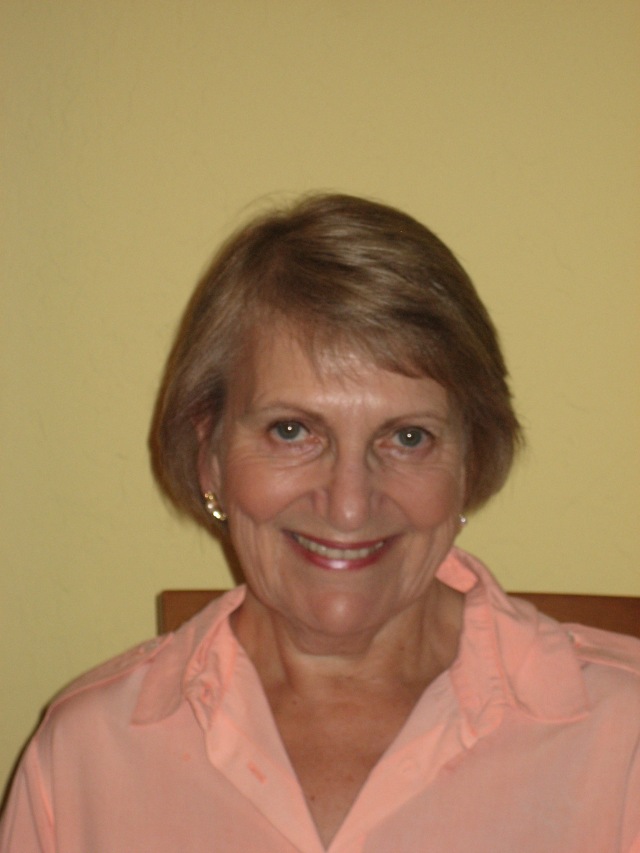
Lorraine Midanik
Stuart Bousel: I’m working on a whole bunch of stuff I kind of can’t talk about. What I can talk about is that I’ll be going to Seattle in Septmeber to see the Seattle premiere of my play Everybody Here Says Hello! I’ll also be directing the October Theater Pub, which will be a short and furious version of Richard III. There’s a billion other things going on, but that’s all I can say… for now.
What upcoming shows or events in the Bay Area theater scene are you most excited about?
Megan Cohen: My own, of course! Anyone who says they care more about someone else’s shows than about their own is probably L-Y-I-N-G. That said, I’m really feeling Will Eno these days and am excited about The Realistic Joneses finally coming to SF (March 2016); I’ll follow actress Megan Trout to the ends of the earth, even if it means seeing Eurydice AGAIN (at Shotgun Players this time, Sept-Aug 2015); and you’ll certainly see me in Theater Pub audiences a lot in the coming months.
Elizabeth Flanagan: Aside from all the amazing Pint-Sized shorts you mean? I’ve never seen Sarah Ruhl’s Eurydice so I definitely want to catch Shotgun’s production later this month.
Juliana Lustenader: I am looking forward to the Theatre Bay Area Awards this fall. I wasn’t able to attend last year, but many of my friends and colleagues were celebrated. Bay Area theatre companies stepped up their game this year and produced some spectacular shows, so I’m interested to see what the adjudicators enjoyed most. But more honestly, I can’t wait to celebrate with everyone.
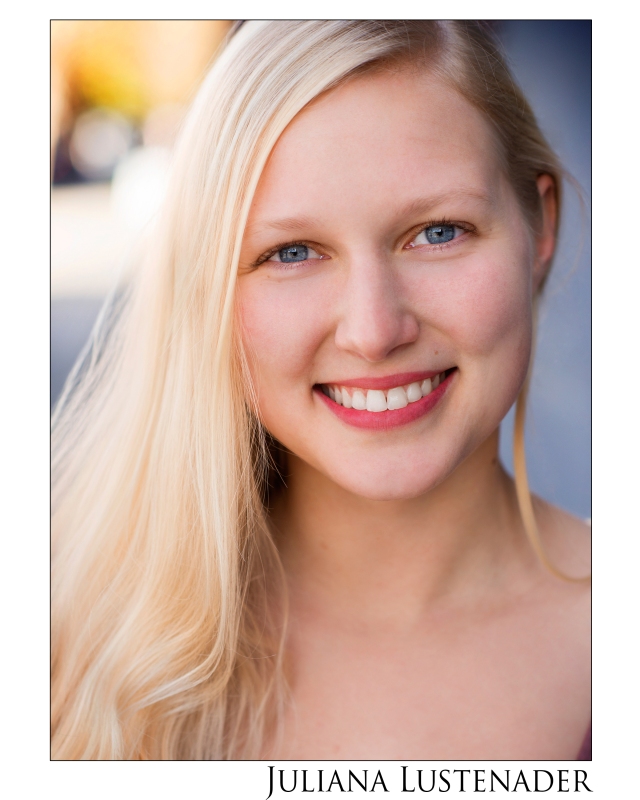
Juliana Lustenader
Christina Augello: The 24th San Francisco Fringe Festival coming September 11-26th and of course Theatre Pub’s Pint-Sized Festival!
Alan Coyne: Other than my own, I’m looking forward to seeing Eat the Runt at Altarena Playhouse, and SF Olympians this November.
Daniel Ng: SF Olympians. It’s such a varied showcase of ideas and talent and 100% local.
Christine Keating: I’m looking forward to Disclosure from Those Women Productions at PianoFight, as well as the upcoming seasons at Custom Made, Magic Theatre, and Marin Theatre Company. Also, all the shows that are happening soon that I’m exciting about but won’t remember until closing weekend, and then rearrange everything to catch them!

Christine Keating
Lorraine Midanik: I am particularly excited by venues that feature plays by women and include strong roles for women. 3Girls Theater immediately comes to mind as well as Shotgun Players that is producing an entire season of plays written by women.
Jeremy Geist: I haven’t really been paying attention to anything.
What’s your favorite beer?
Megan Cohen: Free!
Christine Keating: I’m more a cider person, I mostly drink Angry Orchard.
Alan Coyne: Smithwick’s, for purely patriotic reasons.
Christina Augello: I don’t like beer, sorry!
Juliana Lustenader: Hoegaarden, ‘cause day drinking.
Stuart Bousel: Bass. Harp. In my 20s I would frequently two-fist both.
Lorraine Midanik: I know this is going to sound odd, but I don’t drink beer. (Please don’t throw me out of the Festival!). I am actually a cocktail (whiskey sour) and wine person. When I find myself in a pub where cocktails and wine are unavailable or possibly frowned upon, I either order a hard cider (hopefully fruit flavored) or a shandy (beer mixed with lemonade or ginger ale). Forgive me!
Jeremy Geist: Anything from this bracket http://www.sbnation.com/2015/3/23/8277455/jon-and-spencers-beer-bracket-its-the-great-beer-bracket-challenge-so
Daniel Ng: Still Guinness. Always Guinness. They say you can drink it straight out of the new bottles, but they’re lying. Use a glass, you savages.
Elizabeth: Feels like I’m obligated to say Guinness. Which may or may not be true. You’ll have to catch me at SF Theater Pub’s Pint-Sized Fest to find out for sure!
The Pint-Sized Plays will perform four times: August 17, 18, 24, and 25 at 8 PM at PianoFight, 144 Taylor St, San Francisco. Admission is FREE to all performances. For more information, click HERE!

